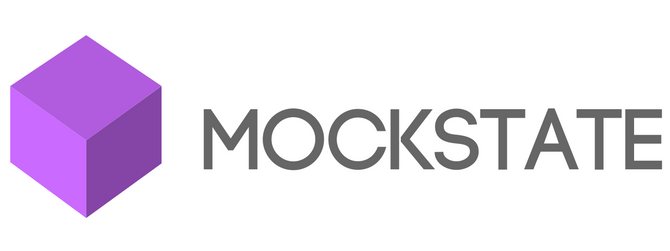Deprecated! Use Dutier instead.
Mockstate is a centralized state management for Javascript applications. It provides more control of your state application with a simple and efficiently API and keep the state safe, when the user connection goes offline the state is saved in localStorage to be picked up when the connection back.
💁 See the React.js Todo ➞
React.js Todo with Mockstate ➞
Preact.js + Mockstate ➞
Mockstate provides more control of your application state. It's envolve ideas of Redux and Flux, but explores all power of Promises, doing the work with async action easy.
- Npm:
npm install mockstate - Bower:
bower install mockstate - CDN:
https://unpkg.com/[email protected]
- More control of you application state.
- Safe State.
- It's pure flux, the flow is unidirectional.
- Tiny API.
- Actively maintained and being used in production.
The application state is stored in an object tree inside a single store.
The only way to change the state tree is to emit an action, that always return a Promise.
You can receive the result of your action using .then after your dispatch call.
That's it!
import { setState, setActions, subscribe, dispatch } from 'mockstate';
/**
* Set your store state in a single object.
*/
setState({
count: 0
})
/**
* Set your store state in a single object,
* that always receive the store state as first argument.
*/
setActions({
increment: ( state, n ) => {
let count = state.count += n
return count;
}
});
/**
* You can use subscribe() to update your UI in response to state changes.
* `${this}` can be your UI component, where the subscribe handler will be applied.
*/
subscribe( this, ( data ) => {
console.log(`Some action was called, Action name: ${data.action} Action Value: ${data.value}.`);
})
/**
* The only way to mutate the internal state is to dispatch an action.
* You can receive the response of your action and do something, or not.
*/
dispatch('increment', 1).then( data => {
console.log(`The result of this action ${data.action} is: ${data.value}`);
})
//1
dispatch('increment', 1);
//2
dispatch('increment', 1);
//3Dispatch
- Trigger some action for do something. A Promise will be returned, that contain an Object with the
keysactionandvalueof your correspondent action response.
/**
* @name dispatch
* @description Trigger some action.
* @param {string} actionName Action name
* @param { arguments } Arguments You can pass the arguments after the actionName
* @return {Promise} Return a Promise with an Object that contain the value
* of the action and the action name.
* {value, action} = data;
*/
// On your component
import {dispatch} from 'mockstate';
// You can receive the response of your action and do something, or not.
// If you whant, you can chaining the dispatch Promises.
dispatch('increment', 1)
.then( data => {
console.log(`The action will be called. The result is: ${data.value}`);
return data.value;
})
.then( value => {
console.log(`The response is: ${value}`);
})Actions
- Set your actions functions. Your actions always needs to return a value and receive the state as first argument.
/**
* @name setActions
* @description Set the actions functions.
* @param {object} state The Store State as first argument
* @param { any } args Other Arguments
*/
// actions/index.js
import {setActions} from 'mockstate';
setActions({
// each action receive the state as first argument
increment: (state, n) => {
setTimeout(() => {
let result = state.count += n;
return result;
}, 2000)
}
});Store State
- Set the application Store state
/**
* @name setState
* @description Set you application store state
* @param {object} state Your application state data
*/
// store/index.js
import {setState} from 'mockstate';
setState({
count: 1
});Getting the Store State
- Get a state value of your store
/**
* @name getState
* @description Get the state value
* @param {string} stateName The state name
*/
// store/index.js
import {getState} from 'mockstate';
let count = getState('count');Middleware
- Set a middleware function, that will be triggered after the action calls.
/**
* @name middleware
* @description Get the state value
* @param {Function} callback The callback that will be triggered and
* receives the data of your action and the all state of your store application.
*/
// state/index.js
import { middleware } from 'mockstate';
middleware( (data, state) => {
console.log('After action triggers:', data, ' and the Store State is: ', state);
})Emit
- Tell to store that something are happend and the handler function will be triggerd.
/**
* @name emit
* @description Tell to store that something happend,
* and the handler function will be called.
* @return void
**/
// state/index.js
import { emit } from 'mockstate';
emit()
.then( () => {
console.log('After emit called.');
});Subscribe/Unsubscribe
- Subscribe some UI Component for trigger the handler function when some action are trigger.
- Unsubscribe when you don't wnat to trigger the handler function.
/**
* @name subscribe
* @description Subscribe some UI Component for trigger the handler function when some action calls.
* @param { object } BindComponent The UI element that the handler function will be applied.
* @param { handler } handler Your function that will be triggered when some state change.
*/
// components/app/index.js
import {subscribe, unsubscribe, getState} from 'mockstate';
componentWillMount(){
// when some state change, do something.
subscribe(this, ( data ) => {
this.setState({count: getState('count')})
});
}
componentWillUnmount(){
// remove this component for observe the changes on the state
unsubscribe(this)
}MIT License.



